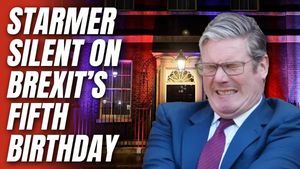The Conservative Party is facing turbulent times as recent polling data indicates it has slipped to third place for the first time, trailing behind both Labour and Reform UK. A new Techne tracker poll, reported by The Independent, shows Labour leading with 26%, closely followed by Reform UK at 24% and the Conservatives at 23%. This concerning shift raises questions about the leadership of Kemi Badenoch, who has dismissed Reform UK as merely a "protest party" amid growing competition.
The polling revelations come just as Reform UK plans to hold a rally at Badenoch's constituency of North West Essex, where Reform leader Nigel Farage is expected to speak. This rally is significant as it coincides with what appears to be increasing support for the Reform Party at the expense of the Conservatives. Farage's comments during the rally likened Reform's rise to Donald Trump’s victory, stirring scrutiny of Badenoch's ability to maintain her party's grip on power.
While attending the rally, Farage encouraged his supporters, warning the Conservatives: “They should be bloody scared of you.” His remarks were underscored by the heated exchange between Badenoch and Farage concerning party membership figures and the assertion of Reform's growing popularity.
Badenoch, during a visit to a farm, expressed confidence, stating she was “not at all” worried about the Reform UK's presence and emphasized the importance of discussing Labour's farming policy over focusing on her constituents. "The job the British people have gave me is to fight for them, be the leader of the opposition, hold the Government to account," she declared. She acknowledges the general trend of protest parties gaining traction but expressed unwavering dedication to her responsibilities.
The rally at North West Essex highlighted the discontent brewing among Conservative supporters. Alan Goldsmith, aged 85, expressed his frustrations, stating, "I’ve been voting Conservative all my life, but I will never ever vote Conservative again because they’re unbelievable idiots." His candid remarks reflected the sentiments of many traditional Conservative voters who feel disillusioned. He critiqued the political discourse prevalent today, which he believes is disconnected from the realities of the voters. "When you look on television and there’s a Labour adviser and a Conservative adviser, they’re all young guys who haven’t really lived," Goldsmith added.
Harrison Grose, 22, emerged as another supporter voicing reasons for the party's appeal among younger voters. Being mindful of social issues and traditional values, he advocates for personal effort and ambition against what he perceives as destructive socialist ideals. "It’s about striving to achieve in life," he said, emphasizing the need for trustworthiness among politicians. "Time and time again voters, the electorate, has been told by the Conservatives ‘We’re going to reduce mass migration. We’re going to do this. We’re going to do something. And I think it’s time some of this gets done."
This competition reflects the broader challenges facing the Conservative Party as it struggles to connect with its base. Many analysts suggest if this trend continues, it could lead to significant consequences both for party leadership and electoral success. The emergence of Reform UK as significant political players denotes not just changes within the parties but also indicates how the dynamics of political engagement among voters are shifting.
Farage’s rally also pointed out the internal issues within Reform UK, as he conceded past vetting of candidates had faced serious issues. This admission reveals the growing pains of the party dynamics as it contends for legitimacy and trust among voters. Despite these challenges, Farage remained optimistic about the potential for breakthrough success, asserting to the crowd: “This is not just going to be an earthquake in British politics. This is going to be the biggest historical political change this country has ever seen.”
With the Conservative Party at risk of being overtaken by competing sentiments, the internal rifts and changing allegiances among its supporters will likely shape the political narrative leading to the next election. This newfound support for Reform UK may genuinely signal not just discontent with the Conservatives, but also a shift toward alternative political avenues for British voters.
Overall, as the polls suggest fluctuated results among the major parties, this ticking clock may lead to extraordinary changes and challenges for the governing parties. Politicians on all sides will need to adapt to the changing political landscapes being forged by voters represented by parties like Reform UK.



